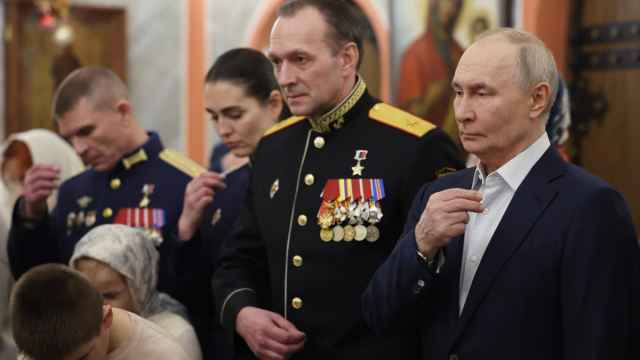The breakaway region of Abkhazia, an ally of Russia, lies just south of Sochi, but its border with Russia will be closed for the duration of the Games, and the region has not seen as many benefits from preparations as originally expected. Abkhaz President Alexander Ankvab spoke with The Moscow Times about the Olympics' impact on the region.
Q: The Winter Olympics in Sochi are less than two weeks away. What was the effect of the Olympics on the economy and security of Abkhazia?
A: If you mean what our country gained from the preparations to the games, then I can tell you, first, it was the experience of participating, even if not on a very large scale, in such a grandiose event. Throughout this period, law enforcement and security agencies of Abkhazia and Russia cooperated and continue to cooperate in order to create comfortable conditions for both participants and visitors of the games. Other government agencies, including those responsible for transportation and communications, have done a lot of work together with their Russian counterparts.
I believe this experience of cooperating on such an outstanding project will be very beneficial for us. Given the plans to further develop resorts in the neighboring North Caucasus, in Sochi in particular and in Abkhazia, this experience will prove useful in the future. This is obvious.
Q: Have Abkhaz workers and companies participated in building Olympic sites in Sochi?
A: We know that some of our citizens have worked on Olympic sites. In addition, some companies have supplied raw materials for construction totaling about 3.3 million cubic meters.
Q: Will an Abkhaz delegation participate in the Games?
A: We are not members of the United Nations and consequently are excluded from the International Olympic Committee. That is why Abkhaz athletes and teams do not participate in the Games under their national flag. This is another vivid example of double standards and essentially false principles of organization of international sporting events. You probably know that many international organizations, even those that preach exclusively humanistic ideals, are essentially politicized. This has become an established tradition already.
We also cannot accept and are confused by Georgia's stance. Due to Georgia's protest, the Eurasian Broadcasting Enterprise rejected the application of Abkhaz journalists who wanted to go and cover the Games in Sochi. Please note — the journalists are banned from conducting their work that is in no way connected to politics.
What would be the effect on the global and regional political situation if two or three Abkhaz journalists covered sporting events and described to their audiences what they saw with their own eyes? These situations shape our attitude toward all other initiatives of international organizations and Georgia itself, including to conflict resolution.
We also believe that this situation cannot last indefinitely.
This interview was conducted in Russian via e-mail.
Contact the author at [email protected]
A Message from The Moscow Times:
Dear readers,
We are facing unprecedented challenges. Russia's Prosecutor General's Office has designated The Moscow Times as an "undesirable" organization, criminalizing our work and putting our staff at risk of prosecution. This follows our earlier unjust labeling as a "foreign agent."
These actions are direct attempts to silence independent journalism in Russia. The authorities claim our work "discredits the decisions of the Russian leadership." We see things differently: we strive to provide accurate, unbiased reporting on Russia.
We, the journalists of The Moscow Times, refuse to be silenced. But to continue our work, we need your help.
Your support, no matter how small, makes a world of difference. If you can, please support us monthly starting from just $2. It's quick to set up, and every contribution makes a significant impact.
By supporting The Moscow Times, you're defending open, independent journalism in the face of repression. Thank you for standing with us.
Remind me later.





